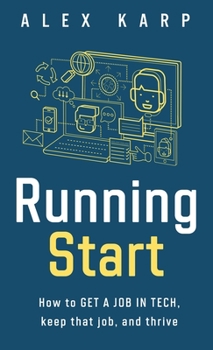Running Start: How to get a job in tech, keep that job, and thrive
Select Format
Select Condition 
Book Overview
You're looking for your first software engineering job. Maybe you're graduating college or maybe you've decided to switch careers. Maybe you're finishing up at a coding bootcamp or maybe you taught yourself how to code.
You've come to the right place.
Getting a job is hard. Getting the right job is harder.
How do I know which companies and positions to apply for?How do I get an interview?How do I prepare for my interviews?How do I look for red flags that should turn me away from a company?How do I navigate one or more offers?But once you've gotten the job, the fun is just beginning. Now you have questions like:
How do I make a good first impression?How do I set myself up for success?Am I moving too slowly?What's my manager thinking?I can't do this. I'm in over my head. Are they going to fire me?And even once you're feeling comfortable in your new role, you'll have yet more questions.
What should I be doing to get promoted?How do I identify growth opportunities?Where do I want my career to lead?When is it time to look for a new job?These are all real questions that I've asked myself throughout my career. These are the things that I wish I would have known when I was first starting out and even as I've progressed.
I've learned a lot the hard way, by making mistakes and learning from others. In my last several years as an engineering manager, I've also learned a lot about what your manager thinks, how to use your manager effectively, and how to navigate your career. And I've been taking notes.
Are you interested in a strategy guide for your software engineering career?
What if you could learn from my mistakes and insights and grow faster in your career?
What if you knew how to avoid opportunities that would hold you back or would even be toxic?
What if you knew how to take what it is that makes you unique and make that your biggest selling point?
That's why I wrote Running Start.
My goal is to help you get a job, keep that job, and thrive. Not only in that first job, but in your entire career.
My target audience is anyone who isn't stereotypically represented in tech, including but not limited to: women, BIPOCs, self-taught, career switchers, bootcamp graduates, and many more. But I also hope that this book will be useful to anyone in tech.
With that in mind, I took great care to make sure point out where people's experiences might differ from the "norm". I also tried to get as diverse a set of pre-readers as possible to really hold me accountable for making sure I do right by all backgrounds and experiences.
My goal is to get as many different people in tech as possible. Not because of some artificial diversity targets but because I truly believe that the best teams are the ones that are the most diverse. Not only that, but the teams that have the most different kinds of diversity. It takes a village to be a truly successful development team. You need people from different backgrounds, with different life experiences, different skillsets, different abilities and disabilities. The more diverse a team is, the better a product they'll put out. I'd bet a million dollars on it.
This book is my way of trying to help make that happen.





